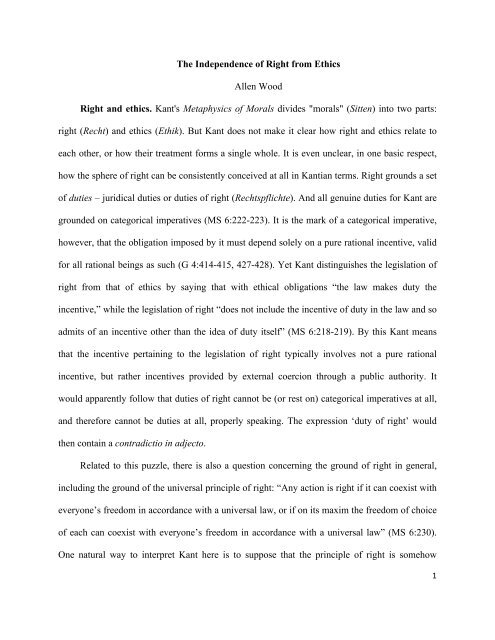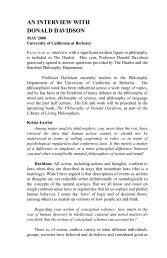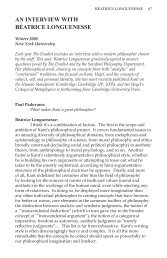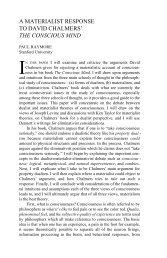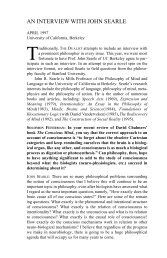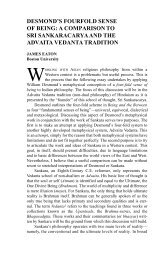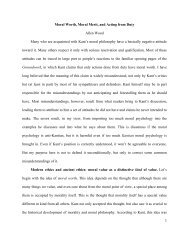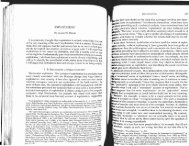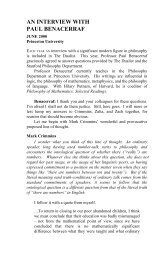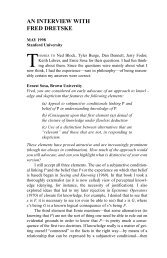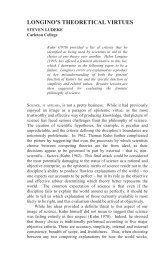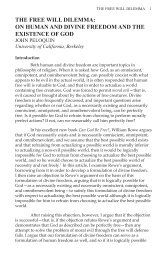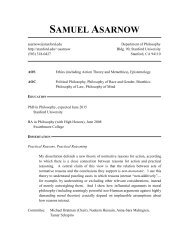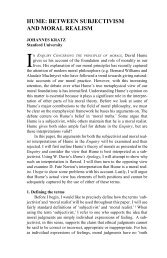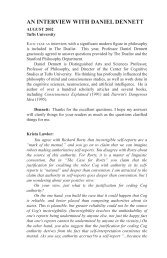The Independence of Right from Ethics Allen Wood Right and ethics ...
The Independence of Right from Ethics Allen Wood Right and ethics ...
The Independence of Right from Ethics Allen Wood Right and ethics ...
Create successful ePaper yourself
Turn your PDF publications into a flip-book with our unique Google optimized e-Paper software.
imperative <strong>of</strong> duty, then Kant seems to be equally silent on what that independent ground couldbe.<strong>Right</strong> is grounded on external freedom. In my view, the key to finding a possible paththrough these difficulties is to recognize that Kant rejects the common idea that the sphere <strong>of</strong>right, including the philosophy <strong>of</strong> law <strong>and</strong> politics, consists merely in an application <strong>of</strong> generalmoral principles to the specific circumstances <strong>of</strong> law or the political state. We must underst<strong>and</strong>right, in other words, as grounded independently <strong>of</strong> the principle <strong>of</strong> morality. This ground, as Isee it, is one which identifies right with the conditions for protecting what Kant calls ‘externalfreedom’ – freedom as the independence <strong>from</strong> constraint by the choice <strong>of</strong> another (MS 6:237).Considering the conditions under which people may have external freedom in accordance withuniversal law permits us to see how right might be a separate sphere <strong>of</strong> morals (Sitten), entirelyindependent <strong>of</strong> the sphere <strong>of</strong> <strong>ethics</strong>, one that rests on grounds <strong>of</strong> practical reason that areindependent <strong>of</strong> the categorical imperative that grounds ethical duties, even though the basis <strong>of</strong>right does have something in common with the basis <strong>of</strong> <strong>ethics</strong>, making both <strong>of</strong> them spheres <strong>of</strong>morals.External freedom is the freedom <strong>of</strong> a person to make choices independently <strong>of</strong> constraintby the choices <strong>of</strong> others. <strong>The</strong> only way for my choices to be completely independent <strong>of</strong> everyoneelse’s, however, would be for me to have absolute power over their choices. <strong>The</strong> externalfreedom <strong>of</strong> any given person, therefore, must always be limited, since otherwise no one elsecould have any external freedom. That, however, is just the point <strong>of</strong> the universal principle <strong>of</strong>right: it declares that external freedom, for any given person, is rightful freedom only when it cancoexist with the freedom <strong>of</strong> all others according to universal law (MS 6:230).3
<strong>The</strong> foundation <strong>of</strong> the entire sphere <strong>of</strong> right lies in the fact that human beings have goodreason to protect rightful freedom; <strong>and</strong> this reason is independent <strong>of</strong> ethical value, <strong>and</strong> <strong>of</strong> theprinciple <strong>of</strong> morality grounding ethical duties. <strong>The</strong> problem is to underst<strong>and</strong> this independentground <strong>of</strong> rightful freedom, <strong>and</strong> also how it remains independent <strong>of</strong> the value that grounds thecategorical imperative <strong>of</strong> morality that Kant derived in the Groundwork. Another way to look atthis problem is to see it as providing an interpretation <strong>and</strong> defense <strong>of</strong> Kant’s claim that rightfulexternal freedom – independence <strong>from</strong> constraint by the choice <strong>of</strong> another – is “the sole original<strong>and</strong> innate right belonging to every human being by virtue <strong>of</strong> his humanity” (MS 6:237). And ifthe sphere <strong>of</strong> right is to be independent <strong>of</strong> that <strong>of</strong> <strong>ethics</strong>, this defense must be independent <strong>of</strong>Kant’s claim in the sphere <strong>of</strong> <strong>ethics</strong> that humanity in persons is an end in itself.External freedom <strong>and</strong> the rational structure <strong>of</strong> action. <strong>The</strong> solution to this problem, Ibelieve, lies in Kant’s conception <strong>of</strong> the fundamental rational structure <strong>of</strong> action. All action forKant is based on setting an end – an object or state <strong>of</strong> affairs to be produced. It is the essentialcharacteristic <strong>of</strong> rational nature to set ends: “Rational nature discriminates itself <strong>from</strong> the rest inthat it sets itself an end” (G 4:437). An action, by its concept, is that which lies within the power<strong>of</strong> the agent, <strong>and</strong> is chosen by the agent as a means to some end (G 4:417). Kant says: “Thatwhich serves the will as the objective ground <strong>of</strong> its self-determination is the end… By contrast,what contains merely the ground <strong>of</strong> the possibility <strong>of</strong> the action whose effect is the end is calledthe means” (G 4:427).Practical reason applies to action in a variety <strong>of</strong> ways. First, it applies instrumentally: Rules<strong>of</strong> skill tell us the best means to a given end, while a technical imperative <strong>of</strong> reason, groundingthe rational authority <strong>of</strong> such rules, requires us, on pain <strong>of</strong> a failure <strong>of</strong> rationality, to take theindispensable means in our power toward any end we have set (G 4:414-415). Second, reason4
applies to action prudentially: Pragmatic or prudential reason counsels us to form an idea <strong>of</strong>happiness, to make it an end, <strong>and</strong> to give it rational priority over all other ends <strong>of</strong> inclination (G4:415-416). And third, reason applies to action in the form <strong>of</strong> the moral law: <strong>The</strong> general basis <strong>of</strong>all ethical duties is the moral law as presented in the Formula <strong>of</strong> Humanity as End in Itself (FH),An end in itself is not an end we set or an object to be brought about, but something alreadyexisting having a value for whose sake we are required to do or refrain <strong>from</strong> certain actions (G4:427-430). <strong>The</strong> categorical imperative that grounding our ethical duties comm<strong>and</strong>s us to setcertain ends -- our own perfection <strong>and</strong> the happiness <strong>of</strong> others (MS 6:385-388). <strong>The</strong> moral lawalso forbids us to set certain ends (for example, the unhappiness <strong>of</strong> others, pursued for its ownsake), <strong>and</strong> it further forbids us to use certain mean to our ends that are inconsistent with treatingourselves or other rational beings as ends in themselves.All ethical obligations, all categorical imperatives, rest in this way on rational constraintsarising out <strong>of</strong> ends – ends in themselves, which we are required to treat as ends, or ends we arerequired by morality to set. All actions required or forbidden by <strong>ethics</strong>, or by categoricalimperatives, are required or forbidden on account <strong>of</strong> some end -- ultimately, the objective worth<strong>of</strong> humanity as an end in itself, which we are required to respect in our actions. But the ethicalimperative treats actions as required, prohibited or meritorious on account <strong>of</strong> their relation toobligatory ends to be produced: our own perfection <strong>and</strong> the happiness <strong>of</strong> others (MS 6:385-388).Envious or malicious actions, for example, are forbidden because they make the unhappiness <strong>of</strong>some person into an end, while actions that perfect our skills or improve our character aremeritorious because they further the end <strong>of</strong> our own perfection <strong>and</strong> beneficent actions aremeritorious because their end is the happiness <strong>of</strong> another.5
<strong>Right</strong>, by contrast with <strong>ethics</strong>, has to do with a class <strong>of</strong> prescriptions <strong>and</strong> prohibitions onactions that arise wholly independently <strong>of</strong> the ends <strong>of</strong> these actions. <strong>Right</strong> “has to do only withthe formal condition <strong>of</strong> choice that is to be limited in external relations in accordance with laws<strong>of</strong> freedom, without regard for any end (the matter <strong>of</strong> choice)” (MS 6:375). More specifically,right has to do with actions merely ins<strong>of</strong>ar as they relate to the freedom <strong>of</strong> others to choose theirown actions in furtherance <strong>of</strong> ends these others have freely set. Setting an end is an act <strong>of</strong>freedom. One cannot be compelled (or coerced) to set an end, but one can be coerced to performactions which are means to ends set by others rather than to one’s own ends. “Another canindeed coerce me to do something that is not my end (but only a means to another’s end) but notto make this my end” (MS 6:381). External freedom consists in choosing actions that are meansto ends you have set, while being forced to act in ways that are means to the ends <strong>of</strong> others is theabsence or violation <strong>of</strong> external freedom. <strong>Right</strong> consists in those rational constraints on ouractions that have to do not with the ends <strong>of</strong> those actions but instead with the formal conditionsunder which your actions are compatible with the external freedom <strong>of</strong> rational beings in general,according to universal laws that guarantee a like external freedom for all.<strong>The</strong> foundation <strong>of</strong> right therefore consists in a rational ground that all rational beings havefor requiring the protection <strong>of</strong> external freedom <strong>of</strong> all according to universal law. What couldsuch a ground be? It is this: As a rational being, I necessarily set ends. This implies a rationalrequirement that I be free to choose the actions by which I pursue those ends. An end is notmerely an object I merely desire or wish for; it is essentially an object I pursue through myactions, conceived by me as means to that end. Human beings -- beings with practical reason --are not beings who have their desires satisfied merely by the mechanism <strong>of</strong> nature (for instance,by the mechanical operation <strong>of</strong> instincts) or through the beneficent agency <strong>of</strong> beings other than6
themselves -- such as gods, or robots. For in order to serve the ends <strong>of</strong> human beings, even godswould have to be prayed to, <strong>and</strong> robots would have to be programmed <strong>and</strong> comm<strong>and</strong>ed (if onlyby a remote control device); these actions <strong>of</strong> praying or comm<strong>and</strong>ing would have to be freelychosen as means to the ends the human beings have freely set. Another way <strong>of</strong> putting it is this:Human beings have the privilege -- or, if you prefer, they are subject to the curse (Kantrecognizes that it can be viewed in both ways) -- that whatever good they achieve, <strong>and</strong> whateverhappiness they enjoy, must be the result <strong>of</strong> their own work: it must arise <strong>from</strong> their setting an end<strong>and</strong> their selecting, or perhaps inventing, the means necessary to achieve it, <strong>and</strong> then applying themeans through actions chosen by the human being as such means (cf. I 8:19-20, MA 8:111-112).It follows that as a rational being, I necessarily will in general, <strong>and</strong> as far as possible(consistent with other dem<strong>and</strong>s <strong>of</strong> reason) that the actions I perform should serve ends I have set,rather than serving different ends, ends set by others. This is a necessary dem<strong>and</strong> <strong>of</strong> rationalagency, part <strong>of</strong> its essential structure. It is also a dem<strong>and</strong> entirely independent <strong>of</strong> whateverparticular ends I may have, or even the ends I ought to have. Moreover, I recognize that otherrational beings necessarily have exactly the same rational interest that I do in choosing theiractions to further their own freely chosen ends, rather than having their actions constrained topromote ends chosen by others. To recognize a being – whether oneself or another -- as a rationalagent is to view it as lying under the indispensable rational necessity that it wills to be free, as faras possible, consistent with other dem<strong>and</strong>s <strong>of</strong> reason, to pursue its own ends rather than beingforced to have its actions serve the ends set by others without its freely given co-operation orconsent.My dem<strong>and</strong> to be externally free is therefore qualified by the dem<strong>and</strong> <strong>of</strong> reason that othershave the same rational claim on external freedom that I do. No one’s external freedom can7
therefore be unlimited if others are to be externally free as well. This is the ground <strong>of</strong> thequalification: “consistent with other dem<strong>and</strong>s <strong>of</strong> reason,” that must be added to the rationaldem<strong>and</strong> for external freedom that each rational being must make.<strong>The</strong> ends <strong>of</strong> morality are objective or binding on us because they are ends we recognize asrationally valid irrespective <strong>of</strong> the particular wishes, desires, ends or interests <strong>of</strong> individuals. <strong>The</strong>happiness <strong>of</strong> each individual has a moral claim on other individuals because it has a value thatcan be recognized by any rational being. Persons are ends in themselves because they have avalue that is not conditional on anyone’s empirical wishes or desires but makes an impartialclaim on us through a comm<strong>and</strong> <strong>of</strong> reason. Something analogous, but quite distinct, is true <strong>of</strong> theother constitutive necessity <strong>of</strong> rational nature I have just identified – namely, its requirement thatit be free to choose actions in furtherance <strong>of</strong> ends set by it rather than having its actions forced toserve ends it does not share.Coercion is a restriction on external freedom: To coerce someone is to force them to act ina way that conforms to your will rather than theirs, <strong>and</strong> makes their actions serve ends you haveset which are not ends they have set. Kant’s theory <strong>of</strong> right is based on the idea that the only waycoercion could ever be justified is in the name <strong>of</strong> protecting external freedom – the very freedomthat coercion annuls, infringes or limits. A person cannot be justifiably coerced for the sake <strong>of</strong>the value <strong>of</strong> any end whatever: neither the happiness <strong>of</strong> another, nor the happiness <strong>of</strong> all, noreven the happiness <strong>of</strong> the person who is coerced, could provide an adequate ground for thecoercion <strong>of</strong> a free <strong>and</strong> rational being. Such a reason could consist only in the fact that thecoercion in question is required in order to protect the external freedom <strong>of</strong> rational agents ingeneral – rightful freedom, external freedom according to universal law. Kant takes it to be ananalytic judgment that coercion that protects rightful freedom is itself in accord with right (MS8
6:231). “<strong>Right</strong> <strong>and</strong> authorization to use coercion therefore mean one <strong>and</strong> the same thing” (MS6:232).This is the basic reason why right <strong>and</strong> not <strong>ethics</strong> can be the source <strong>of</strong> duties whosefulfillment may be externally coerced. Ethical duties are based on ends – on the rationalrequirement that we set <strong>and</strong> pursue certain ends that are also duties --which Kant calls “duties <strong>of</strong>virtue” (MS 6:382-385). <strong>The</strong>se ends belong to the categories: our own perfection, <strong>and</strong> thehappiness <strong>of</strong> others (MS 6:385-388). Because a rational being cannot be externally coerced to setan end, the fulfillment <strong>of</strong> ethical duties cannot be externally coerced: “Duties <strong>of</strong> virtue cannot besubject to external legislation simply because they have to do with an end which (or the having<strong>of</strong> which) is also a duty. No external legislation can bring about one’s setting an end forhimself,…although it may prescribe actions that lead to an end without the subject making it hisend” (MS 6:239). But it would be wrong (contrary to right) to try to coerce the fulfillment <strong>of</strong> anethical duty by coercing the agent to fulfill an end that agent has not set. <strong>The</strong> fulfillment <strong>of</strong>ethical duties must always be through self-constraint, not external constraint or coercion (MS6:379). <strong>The</strong> attempt to derive duties <strong>of</strong> right <strong>from</strong> the supreme principle <strong>of</strong> morality musttherefore necessarily fail, since the only duties that can be derived <strong>from</strong> this principle are dutiesit would be wrong (contrary to right) to coerce anyone to fulfill.<strong>Right</strong> <strong>and</strong> universal law. It is not a requirement <strong>of</strong> merely prudential reason, still less <strong>of</strong>merely instrumental reason, that we should will to be free to choose actions that further our ownends. For this requirement applies not only to our self-interested actions, but to all our actions assuch. As far as reason permits, we will them to be chosen by us to serve our ends, rather thanbeing forced to serve the ends <strong>of</strong> others. Further, when we take the st<strong>and</strong>point <strong>of</strong> reason,abstracting <strong>from</strong> all partiality to ourselves, we also see <strong>from</strong> this perspective that every rational9
eing equally requires that its freedom be protected <strong>from</strong> destruction, limitation or usurpation bythe choice <strong>of</strong> another.And just as morality requires us, when we set our ends <strong>and</strong> choose means to them, to act onmaxims that hold as universal laws <strong>from</strong> the impartial st<strong>and</strong>point <strong>of</strong> reason, so reason alsorequires us to recognize every person’s equal right to be free <strong>from</strong> the constraint <strong>of</strong> the will <strong>of</strong>others in choosing his actions. This rational requirement <strong>of</strong> equal freedom consists in having thechoice <strong>of</strong> every rational being protected <strong>from</strong> external interference to the fullest extent that it canbe, consistently with a like freedom <strong>of</strong> all others according to universal law. <strong>The</strong> coercion that isconsistent with right depends on the claim that everyone’s external freedom must be limited inorder that all may have external freedom. No one’s external freedom should be limited merelyfor the sake <strong>of</strong> some end, either <strong>of</strong> that person or <strong>of</strong> others. But the external freedom <strong>of</strong> each <strong>of</strong>us must be restricted in order that others may be externally free. This is the basis, in Kant’stheory <strong>of</strong> rational action, for right, the supreme principle <strong>of</strong> right, <strong>and</strong> all the claims <strong>and</strong> duties <strong>of</strong>right. In both <strong>ethics</strong> <strong>and</strong> in right, there is a rational constraint imposed by the equal recognition <strong>of</strong>others, or, as we may also put it, by the requirement that our actions conform to the constraints <strong>of</strong>universal law. This formal constraint <strong>of</strong> reason, requiring the recognition <strong>of</strong> others as having thesame claims we do, <strong>and</strong> limiting permissible actions to those conforming to universal law, iscommon to duties <strong>of</strong> right <strong>and</strong> <strong>of</strong> <strong>ethics</strong>. That is what makes these two spheres both spheres <strong>of</strong>“morals” (Sitten).To put the same point another way: Neither ethical duties nor duties <strong>of</strong> right are based on aselfish calculation to the effect that if I treat others in a certain way, they will treat me in asimilar way. Duties <strong>of</strong> beneficence are not based on the thought that if I help others when theyare in need, then they will (be more likely to?) help me when I am in need, or conversely, that if I10
do not help them, then they (probably?) won’t help me either. Likewise, I do not have a duty torefrain <strong>from</strong> violating the rightful freedom <strong>of</strong> others because I think that will make it more likelythat they will refrain <strong>from</strong> violating mine. Both cases involve, rather, an impartial claim <strong>of</strong>reason grounded on the constraint <strong>of</strong> universal law.What the two spheres have in common, therefore, is their subjection to “the categoricalimperative, which as such only affirms what obligation is: act upon a maxim that can hold as auniversal law” (MS 6:225). I speculate that those who interpret right as grounded on the supremeprinciple <strong>of</strong> morality that applies to <strong>ethics</strong> may do so because they are thinking <strong>of</strong> the moral lawas nothing but the requirement <strong>of</strong> universalizability. But this is only one aspect <strong>of</strong> the moralprinciple -- the formal aspect (represented by the Formula <strong>of</strong> Universal Law or Law <strong>of</strong> Nature) --which needs to be complemented by formulas that provide <strong>ethics</strong> with its characteristic ends <strong>and</strong>motivation (the Formula <strong>of</strong> Humanity as End in Itself), <strong>and</strong> that represent ethical legislation asuniting the ends <strong>of</strong> all rational beings into a system (the Formula <strong>of</strong> Autonomy or Realm <strong>of</strong>Ends) (G 4:436). <strong>The</strong> merely formal aspect <strong>of</strong> <strong>ethics</strong> is indeed present in right as well, but only asa constraint constituting the idea <strong>of</strong> obligation in general, which finds different applications inright <strong>and</strong> in <strong>ethics</strong>.<strong>The</strong> constraints <strong>of</strong> right grounded on the freedom <strong>of</strong> others, <strong>and</strong> the constraint <strong>of</strong> universallaw that applies to <strong>ethics</strong>, are therefore analogous constraints, grounded on the categoricalimperative that expresses merely “the concept <strong>of</strong> obligation.” But these constraints are not thesame, because the application <strong>of</strong> the concept <strong>of</strong> obligation (<strong>of</strong> universal law) is different in thetwo spheres. <strong>The</strong> two constraints are also not such that the one constraint could be derived <strong>from</strong>or be dependent upon the other. <strong>The</strong> ethical claim that others have on our respect <strong>and</strong> concernrests on their value as ends in themselves, but their claims <strong>of</strong> right do not. At most, the ethical11
value possessed by others as ends in themselves would ground the ethical claim that their rightshave on us as moral beings. <strong>The</strong>y could never ground the entitlement <strong>of</strong> one person to haveanother person coerced or externally constrained to respect their rights. That last claim, to thecoercive enforcement <strong>of</strong> external freedom as independence <strong>of</strong> another’s choice, is one thatbelongs to right alone. It could not be derived <strong>from</strong> <strong>ethics</strong>, since the claims <strong>of</strong> <strong>ethics</strong> are neverentitled to coercive enforcement. <strong>Right</strong> therefore rests solely on the claim any person has on anyother, <strong>from</strong> the impartial st<strong>and</strong>point <strong>of</strong> reason, to be left free to choose his actions in furtherance<strong>of</strong> his own ends, rather than being forced to choose them to serve the ends <strong>of</strong> someone else.<strong>The</strong> basis <strong>of</strong> right is the protection <strong>of</strong> external freedom, however it is used, hence not onany <strong>of</strong> the ends individuals might set. But the condition <strong>of</strong> right, in which the external freedom <strong>of</strong>all according to universal law is protected, is a condition into which we may all be coerced toenter (MS 6:256, 312). Preserving <strong>and</strong> perfecting such a condition can therefore also be seen asitself a kind <strong>of</strong> end. <strong>The</strong>se are the sole legitimate ends <strong>of</strong> politics <strong>and</strong> civil law, the only ends thata ruler or politician as such may rightly seek, <strong>and</strong> all actions <strong>of</strong> the public authority may bejustified only in relation to these ends. But it is still never the case that coercion can be justifiedmerely because it serves some valuable end or other. Human perfection, happiness <strong>and</strong>flourishing, for instance, are valuable ends, but no one may be coerced to promote them justbecause they are valuable. It is not because the condition <strong>of</strong> right -- its establishment orpreservation -- may be brought under the general concept <strong>of</strong> a valuable end that we may becoerced into such a condition or coerced to obey its laws or to fulfill duties <strong>of</strong> right. Rather,coercion can be justified only because, it is needed for the preservation <strong>of</strong> the freedom <strong>of</strong> allaccording to universal law, <strong>and</strong> the condition <strong>of</strong> right, is nothing except the condition in whichthis freedom is protected.12
Coercion is never justified in the name <strong>of</strong> any end as such. Ethical duties always rest onends. This is why no ethical duty, as such, can ever carry with it a right <strong>of</strong> coercive enforcement:Forcibly to compel someone to discharge a duty <strong>of</strong> beneficence, for example, is itself a violation<strong>of</strong> the right <strong>of</strong> the person compelled. If duties <strong>of</strong> right had their basis in the categoricalimperative, they too could not be enforced through external constraint. It is only the rationalclaim that the external freedom <strong>of</strong> each person has on every other that grounds duties <strong>of</strong> right.Ethical duties <strong>and</strong> incentives, therefore, could not belong to the sphere <strong>of</strong> right as such. <strong>The</strong>y canneither explain why we have duties <strong>of</strong> right nor determine the content <strong>of</strong> those duties. <strong>The</strong> wholeidea that right must somehow be derived <strong>from</strong> <strong>ethics</strong>, <strong>and</strong> that the universal principle <strong>of</strong> rightmust either be a version <strong>of</strong>, or derived <strong>from</strong>, the categorical imperative, involves a projectiononto Kant <strong>of</strong> the basic error that legal <strong>and</strong> political philosophy is nothing but an application <strong>of</strong><strong>ethics</strong> to the specific circumstances <strong>of</strong> law <strong>and</strong> politics. It is an error inimical to human freedom.<strong>Right</strong> is grounded on our humanity. <strong>The</strong> ethical claim involves the worth <strong>of</strong> every personas an end in itself. This involves an ethical worth that belongs to the humanity <strong>of</strong> every person inKant’s technical sense <strong>of</strong> the term – humanity as the capacity to set ends <strong>and</strong> choose means tothem (G 4:429, KU 6:431, R 6:27, VA 7:322-324, 327). <strong>The</strong> worth <strong>of</strong> humanity as end in itselfprovides the end or matter <strong>of</strong> ethical duty <strong>and</strong> the motive (Bewegungsgrund) for obeying theethical imperative (G 4:426-429). This end in itself is an existent or self-sufficient end (a personhaving a worth for whose sake we act), as distinct <strong>from</strong> the ends to be produced that might be setas ends based on this end (for example, the ends <strong>of</strong> our own perfection or the happiness <strong>of</strong>others). <strong>The</strong> basis <strong>of</strong> the innate right to freedom is also ‘humanity’ in the same technical sense <strong>of</strong>the term: namely, the capacity to set ends according to reason <strong>and</strong> choose actions as means tothem. Each human being has an innate right to freedom “(independence <strong>from</strong> being constrained13
y another’s choice), ins<strong>of</strong>ar as it can exist with the freedom <strong>of</strong> every other in accordance with auniversal law, [which belongs] to every human being by virtue <strong>of</strong> his humanity” (MS 6:237).This basis, however, is distinct <strong>from</strong> the worth <strong>of</strong> humanity as end in itself that groundsethical duties by providing the motive for obedience to a categorical imperative. For one thing,the worth <strong>of</strong> humanity as end in itself grounds only non-coercible (ethical) duties, whereas duties<strong>of</strong> right are subject to external coercion. Also, humanity as end in itself grounds duties on an end(humanity as end in itself), whereas claims <strong>of</strong> right must be independent <strong>of</strong> every end <strong>of</strong> action.<strong>Ethics</strong> places inner (or self-) constraint on the ends-to-be-produced that we adopt (requiring us toinclude our own perfection <strong>and</strong> the happiness <strong>of</strong> others among these ends); but right leaves endsentirely to our free choice, requiring us instead to limit our actions so that they are consistentwith the external freedom <strong>of</strong> others (MS 6:382). Humanity is the ground <strong>of</strong> right in the sense thatto recognize a person as having humanity is to appreciate the rational structure <strong>of</strong> action as achoice <strong>of</strong> means to an end set by the agent, <strong>and</strong> thus the rational requirement that the choice <strong>of</strong>any rational agent <strong>of</strong> be independent <strong>of</strong> the constraining will <strong>of</strong> another in choosing actions asmeans to one’s own ends. That rational requirement, impartially regarded (hence subject touniversal law), is the foundation <strong>of</strong> right.<strong>Right</strong> as external constraint, <strong>and</strong> as right as duty. <strong>The</strong>re is even a rather strong sense inwhich a duty <strong>of</strong> right does not directly ground my doings or refrainings at all. Recall that thelegislation <strong>of</strong> right does not carry with it duty itself as the legislative incentive. And notice againthat Kant states the universal principle <strong>of</strong> right not as a proposition that tells us what to do, butsimply as a proposition that tells us which actions count as ‘right’. It tells us, as Kant says, nothow we should limit our actions, but how they are limited in accordance with external freedom<strong>and</strong> hence how they may be rightfully limited by others. A right action is one that may not, by14
st<strong>and</strong>ards <strong>of</strong> right, be coercively prevented, while an action that is wrong (unrecht), according tothose same st<strong>and</strong>ards, must be subject to coercive prevention. My duties <strong>of</strong> right do not, underthe legislation <strong>of</strong> right, exercise rational constraint directly on me (this they can do only whenregarded under the legislation <strong>of</strong> <strong>ethics</strong>); rather, they specify the use <strong>of</strong> coercive force that othersmay rightfully use on me, <strong>and</strong> it is that coercive force exercised on me that constitutes thebindingness on me <strong>of</strong> a duty <strong>of</strong> right. It is in that sense only that duties <strong>of</strong> right fall under acategorical imperative: they do so for a rational being that sees right actions not merely asactions to which I may be restricted by external compulsion (consistent with the rightful freedom<strong>of</strong> all under universal law) but also actions to which I must internally restrict myself based on theethical incentive to do only those actions that conform to the concept <strong>of</strong> universally bindinglegislation. That is the sense in which the “law <strong>of</strong> right” can be called a “categorical imperative,which as such only affirms what obligation is: act upon a maxim that can hold as a universallaw” (MS 6:225).<strong>The</strong> concept <strong>of</strong> a maxim that can hold as universal law is connected, Kant is claiming, withthe concept <strong>of</strong> obligation, but at a level more abstract than either right or <strong>ethics</strong>, <strong>and</strong> this conceptapplies to the obligations <strong>of</strong> <strong>ethics</strong> <strong>and</strong> right in different ways. In <strong>ethics</strong>, it is applied to themaxims through which individual rational agents ought to govern their own conduct through themotive <strong>of</strong> duty <strong>and</strong> with inner (or self-) constraint. As a rational moral agent, I ought to rejectmaxims as contrary to duty if they cannot harmonize with universal law (G 4:421), <strong>and</strong> I ought toadopt any maxim that comprehends within the same rational volition itself as a universal law forall rational beings (G 4:440).As applied to right, however, this concept concerns not individual self-government, but theconditions under which rational beings may be externally constrained by a comm<strong>and</strong>ing will15
with the power to coerce. Every rational being, as a being that sets ends <strong>and</strong> chooses actions asmeans to them, wills that as far as possible, consistent with other dem<strong>and</strong>s <strong>of</strong> reason, its actionsshould serve its own ends rather than being constrained to serve the ends <strong>of</strong> another. As arational being acting under the idea <strong>of</strong> obligation as conformity to universal law, it can rationallyclaim for itself only so much such external freedom as is consistent with a like freedom for allother rational beings according to universal law. This determines the limits <strong>of</strong> external freedomthat are consistent with right. <strong>The</strong>se two applications <strong>of</strong> the concept <strong>of</strong> obligation as conformityto universal law are distinct <strong>and</strong> even disjoint, since the application to <strong>ethics</strong> concerns inner selfgovernmentonly, not external constraint, <strong>and</strong> the latter concerns only what actions may <strong>and</strong> maynot be externally constrained, not the rules for rational self-government.<strong>The</strong> universal principle <strong>of</strong> right, therefore, cannot possibly be based on or derived <strong>from</strong> thesupreme principle <strong>of</strong> morality -- even if what Kant calls “the universal law <strong>of</strong> right” (MS 6:231)comm<strong>and</strong>s categorically. This is because a categorical imperative is one which carries theincentive to its obedience within itself, rather than borrowing the incentive <strong>from</strong> elsewhere (G4:414). That is what makes the moral law governing <strong>ethics</strong> a principle <strong>of</strong> inner self-governmentrather than a principle <strong>of</strong> external constraint. Since it belongs to the concept <strong>of</strong> juridicallegislation that the incentive must be borrowed <strong>from</strong> elsewhere, hence allowing for externalcoercion as an incentive to obedience, no juridical law or duty <strong>of</strong> right can, considered as such,be a categorical imperative. If in fact there is also a categorical imperative to comply with duties<strong>of</strong> right (as Kant holds that there is, in the form <strong>of</strong> the “universal law <strong>of</strong> right”), then this must bebecause there is also an ethical incentive to comply with the legislation <strong>of</strong> right. “So while thereare many directly ethical duties, internal legislation makes the rest <strong>of</strong> them, one <strong>and</strong> all [i.e.duties <strong>of</strong> right], indirectly ethical” (MS 6:220-221).16
In other words, either duties <strong>of</strong> right are always also (indirectly) ethical duties, or there is anethical incentive, independent <strong>of</strong> the legislation <strong>of</strong> right itself, to comply with duties <strong>of</strong> right.Consequently, duties <strong>of</strong> right, considered as such, are not ethical; they must have a foundationindependent <strong>of</strong> <strong>ethics</strong>, or the supreme principle <strong>of</strong> morality. If it is for us a categorical imperativeto limit our actions to those that are right (according to the universal principle <strong>of</strong> right), this is amatter <strong>of</strong> <strong>ethics</strong>, not <strong>of</strong> right. <strong>The</strong> foundation <strong>of</strong> that principle, <strong>and</strong> <strong>of</strong> duties <strong>of</strong> right, in fact, thefoundation <strong>of</strong> the entire legislation <strong>of</strong> right, must be different <strong>from</strong> <strong>and</strong> independent <strong>of</strong> thecategorical imperative <strong>of</strong> <strong>ethics</strong>. <strong>The</strong> legislation <strong>of</strong> right also st<strong>and</strong>s in need <strong>of</strong> an independentfoundation because right makes stronger claims, in one important respect, than any ethicallegislation could justify. Specifically, duties <strong>of</strong> right may be coercively enforced, while thecoercive enforcement <strong>of</strong> ethical duties is always wrong – contrary to right, hence also (if duties<strong>of</strong> right also make an ethical claim on us) contrary to <strong>ethics</strong> <strong>and</strong> to the categorical imperative.<strong>Right</strong> therefore requires a rational foundation entirely independent <strong>of</strong> <strong>ethics</strong>. And it has one,based on the line <strong>of</strong> reasoning presented above.This is the only way Kant’s theory <strong>of</strong> right makes sense. It is the only way that duties <strong>of</strong>right can be seen as duties whose fulfillment may justifiably be coerced. It is the only way tounderst<strong>and</strong> Kant’s claim that ethical legislation includes the incentive <strong>of</strong> duty, while juridicallegislation leaves out the incentive <strong>from</strong> which duties are to be performed (permitting theseincentives to be supplied by external coercive force). It is the only way to see how right <strong>and</strong><strong>ethics</strong> can be two independent parts <strong>of</strong> morals, while also being subject in common to the generalconcept <strong>of</strong> obligation – based on the condition that our maxims must conform to universal law.Kantian right is sooner socialist than libertarian. <strong>The</strong> basic idea <strong>of</strong> Kant’s theory <strong>of</strong>right is that external freedom -- not being constrained by the choice <strong>of</strong> others, not being forced to17
serve their ends – is an unconditional requirement <strong>of</strong> reason. It is independent <strong>of</strong> <strong>ethics</strong>, <strong>and</strong>independent <strong>of</strong> all ethical values, including the happiness <strong>of</strong> others, or even <strong>of</strong> one’s ownhappiness. <strong>The</strong> exercise <strong>of</strong> coercion by the state, therefore, can never be justified in the name <strong>of</strong>anyone’s welfare or happiness, not even the welfare or happiness <strong>of</strong> all – as utilitarian politicaltheories, for example, seem committed to attempt. Coercion can never be justified except in thename <strong>of</strong> external freedom according to universal law, including the freedom <strong>of</strong> those coerced.This basic idea <strong>of</strong> Kant’s theory <strong>of</strong> right, when stated directly <strong>and</strong> forcefully, has atendency to sound like a libertarian slogan. No doubt this is why Kant’s theory <strong>of</strong> right was atone time read by people like F. A. Hayek, Robert Nozick <strong>and</strong> Mary Gregor as supporting theirlibertarian political ideology. (A recent commentary on the Doctrine <strong>of</strong> <strong>Right</strong> by Sharon Byrd<strong>and</strong> Joachim Hruschka shows that this reading is still alive <strong>and</strong> well.) But earlier twentiethcenturyKantian theories <strong>of</strong> right – those, for instance, <strong>of</strong> Hermann Cohen, Paul Natorp, KarlVorländer, Max Adler, <strong>and</strong> Julius Ebbinghaus -- <strong>and</strong> also the consensus <strong>of</strong> more recenttreatments <strong>of</strong> Kantian right -- by Wolfgang Kersting, <strong>Allen</strong> Rosen, Paul Guyer, LeslieMulholl<strong>and</strong>, Alex<strong>and</strong>er Kaufman, Arthur Ripstein <strong>and</strong> myself – have all defended a verydifferent set <strong>of</strong> conclusions, arguing that Kantian right would sooner result in a social democraticstate than in the state friendly to wealth <strong>and</strong> privilege that is celebrated by libertarians.Libertarians <strong>of</strong>ten claim -- thinking that the claim is good Kantianism -- that no one’sfreedom may be restricted by the state for the sake <strong>of</strong> the welfare <strong>of</strong> others, or even the welfare<strong>of</strong> all. And they are right, as far as that one claim goes. But in practice, their ideology advancesonly the interests <strong>of</strong> concentrated wealth, capital <strong>and</strong> corporate power. That is because their way<strong>of</strong> thinking refuses to acknowledge that it is equally essential to right that the external freedom <strong>of</strong>the rich <strong>and</strong> powerful must be restricted by the state in order to protect the external freedom <strong>of</strong>18
the less rich <strong>and</strong> less powerful. If I must either face destitution or else live only by working foryou on your terms, then I am not free to choose how I live. If I have nothing to eat, nothing towear, no place to live, no protection <strong>from</strong> injury or disease, then I am pr<strong>of</strong>oundly vulnerable tothe coercion <strong>of</strong> others; I do not have a free life in even the most basic sense <strong>of</strong> the term. It istherefore the responsibility <strong>of</strong> the commonwealth (the state) to protect every citizen <strong>from</strong> such afate: not in the name <strong>of</strong> welfare, but in the name <strong>of</strong> freedom. That is truly good Kantianism.Kant does say that the rightful equality <strong>of</strong> citizens, which consists in “each having coerciverights against every other,” is compatible with “the greatest inequality <strong>of</strong> in terms <strong>of</strong> the quantity<strong>and</strong> degree <strong>of</strong> their possessions” (TP 8:291). So he does not object to economic inequality on anygrounds <strong>of</strong> equality. But he takes the rightful freedom <strong>of</strong> each to consist in being able to “seekhis happiness in the way that seems good to him, provided he does not infringe upon the freedom<strong>of</strong> others to strive for a like end which can coexist with the freedom <strong>of</strong> everyone in accordancewith a possible universal law (i.e. does not infringe on the right <strong>of</strong> another)” (TP 8:290). For thisreason, Kant also insists that the rightful independence <strong>of</strong> citizens depends on their havingenough property that each is “his own master” (sui iuris); no one must be forced to live only “bygiving others permission to make use <strong>of</strong> his powers – <strong>and</strong> hence that, in the strict sense <strong>of</strong> theword, he serves no one other than the commonwealth” [in its protection <strong>of</strong> the rightful freedom<strong>of</strong> all] (TP 8:295). <strong>The</strong> basic point here was made even earlier by Rousseau, who argued thatequality is needed because freedom requires it: “As for wealth, no citizen [should] be so veryrich that he can buy another, <strong>and</strong> none so poor that he is compelled to sell himself” (On theSocial Contract, II.11). As Kant sees it, inequality <strong>of</strong> possessions, therefore, infringes right less<strong>of</strong>ten by infringing the rightful equality <strong>of</strong> citizens than by infringing their rightful freedom <strong>and</strong>independence. It is to this that libertarian ideology is systematically (willfully) blind.19
Kant thinks that duties <strong>of</strong> right do not require an assignable individual to whom the duty isowed. He holds that rebellion against a tyrant, does no wrong to him -- since by the injustice <strong>of</strong>his rule he has forfeited the claim not to be overthrown -- but it violates the right, by replacing alaw-governed civil society (albeit an imperfect one) with rule by mere force (EF 8:382). Helikewise thinks that it is wrong to make a lying declaration – a statement made in a contextrequiring truthfulness as a duty <strong>of</strong> right -- even to someone whose misconduct has forfeited anyright to be told the truth (this is the issue separating Kant <strong>from</strong> Constant in Kant’s late essay onthe right to lie) (VRL 8:426).Conversely, Kant thinks a person’s right can be violated even if there is no assignableindividual who has violated it. Thus if the violation <strong>of</strong> my right by a particular person can becalled ‘particular injustice’, there can also be a ‘general injustice’ involving a violation <strong>of</strong> myright, where no assignable individual has wronged me. For instance, a series <strong>of</strong> economictransactions, none <strong>of</strong> which in particular involves a violation <strong>of</strong> anyone’s right, can result insomeone’s being in a position in which they are deprived <strong>of</strong> what is rightfully theirs, <strong>and</strong> in sucha case, it is the responsibility <strong>of</strong> a law-governed civil society to make arrangements to rectify thegeneral injustice.“One can participate in a general injustice, even if one does no injustice according tolaws <strong>and</strong> institutions. Now if one shows beneficence to a wretch, then one has notgiven anything to him gratuitously, but has only given what one earlier helped to take<strong>from</strong> him through the general injustice. For if no one took more <strong>of</strong> the goods <strong>of</strong> lifethan another, there would be no rich <strong>and</strong> no poor” (VE 27:416).<strong>The</strong> wealthy, Kant thinks, are the beneficiaries <strong>of</strong> such injustice, <strong>and</strong> should be made to payin order to rectify it. When the government fails to require them to do this, what such peopleconsider beneficence does not really deserve that name:20
“Having the resources to practice such beneficence as depends on the goods <strong>of</strong>fortune is, for the most part, a result <strong>of</strong> certain human beings being favored throughthe injustice <strong>of</strong> the government, which introduces an inequality <strong>of</strong> wealth that makesothers need their beneficence. Under such circumstances, does a rich man’s help tothe needy, on which he so readily prides himself as something meritorious, reallydeserve to be called beneficence at all? (MS 6:454).<strong>The</strong>re can be no protection <strong>of</strong> rightful freedom, Kant holds, without a state authoritycapable <strong>of</strong> acting in the name <strong>of</strong> all, <strong>and</strong> capable <strong>of</strong> rectifying general injustice as well asparticular injustice. A person cannot be free – their choices independent <strong>of</strong> wrongful constraintby the ends <strong>of</strong> others – unless they have a mode <strong>of</strong> life capable <strong>of</strong> sustaining that independence.Welfare or happiness, for Kant, is an ethical value, with which right has nothing to do. Peopleshould set the happiness <strong>of</strong> others as an end on ethical grounds, but may not be coerced topromote this end. But rightful freedom is the right <strong>of</strong> all; it belongs no more to the wealthy <strong>and</strong>powerful than to anyone else, <strong>and</strong> the possession <strong>of</strong> wealth <strong>and</strong> power give no one the privilege<strong>of</strong> taking it away <strong>from</strong> others. When the social or economic system has such a result, it commitsa general injustice, which it is the responsibility <strong>of</strong> civil society to rectify.Article 25 <strong>of</strong> the United Nations Universal Declaration <strong>of</strong> Human <strong>Right</strong>s holds that“Everyone has the right to a st<strong>and</strong>ard <strong>of</strong> living adequate for the health <strong>and</strong> well-being <strong>of</strong> himself<strong>and</strong> <strong>of</strong> his family, including food, clothing, housing <strong>and</strong> medical care <strong>and</strong> necessary socialservices, <strong>and</strong> the right to security in the event <strong>of</strong> unemployment, sickness, disability, widowhood,old age or other lack <strong>of</strong> livelihood in circumstances beyond his control.”<strong>The</strong>se are rights whose existence is <strong>of</strong>ten denied by libertarians, <strong>and</strong> <strong>of</strong>ten represented bylibertarians <strong>and</strong> utilitarians alike under the heading <strong>of</strong> “welfare.” However, these rights seem tome best justified, as they are by a Kantian theory <strong>of</strong> right, as necessary conditions <strong>of</strong> personalfreedom <strong>and</strong> independence. <strong>The</strong>ir violation may sometimes take place through particular21
injustices, but most <strong>of</strong>ten occurs through the general injustice <strong>of</strong> social customs – the waywomen, for instance, are treated in virtually all cultures, or the general injustice <strong>of</strong> the so-called“free” market (which is <strong>of</strong>ten manipulated by the powerful in ways even libertarians pretend toobject to – though these ways never seem sufficient to dislodge them <strong>from</strong> their pious deferenceto it). A society like ours, that denies a free life to millions upon millions <strong>of</strong> its citizens throughgeneral injustice, subjecting them through economic vulnerability to the arbitrary choice <strong>of</strong>others, cannot all itself a free society just because it leaves the wealthy <strong>and</strong> powerful free to denyothers the freedoms which are theirs by right. It instead comes close to being, in Kant’s technicalsense <strong>of</strong> the term, a barbaric society: ruled by force, where most are deprived <strong>of</strong> rightful freedom(VA 7:331).When human rights in Article 25 are, justified in this way, by being seen as necessaryconditions for a free life, those whose wealth <strong>and</strong> power threatens these rights are not viewed aslacking in “compassion,” missing some virtue which it would be nice if they had, but is at leastacceptable for them to lack. Instead, they are unmasked as what they really are: wrongdoers,criminals in relation to natural rights, refusing respect to the dignity <strong>and</strong> freedom <strong>of</strong> others. Onthe other side, those who dem<strong>and</strong> what is theirs under these rights are not seen as beggars askingfor h<strong>and</strong>outs, but as dem<strong>and</strong>ing no more than what properly belongs to them. Kant saw thesepoints clearly, <strong>and</strong> expressed them eloquently, in two memorable unpublished fragments <strong>of</strong> the1760s:“Many people take pleasure in doing good actions but consequently do not want tost<strong>and</strong> under obligations toward others. If one only comes to them submissively, theywill do everything: they do not want to subject themselves to the rights <strong>of</strong> people, butto view them simply as objects <strong>of</strong> magnanimity. It is not all one under what title I getsomething. What properly belongs to me must not be accorded me merely assomething I beg for” (Ak 19:145).22
“In our present condition, when general injustice is firmly entrenched, the naturalrights <strong>of</strong> the lowly cease. <strong>The</strong>y are therefore only debtors, the superiors owe themnothing. <strong>The</strong>refore, these superiors are called ‘gracious lords’. But he who needsnothing <strong>from</strong> them but justice can hold them to their debts <strong>and</strong> does not need to besubmissive” (Ak 20:140-141).23


